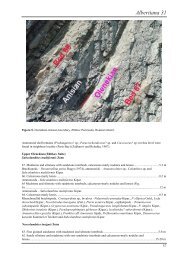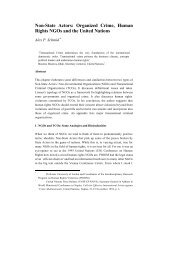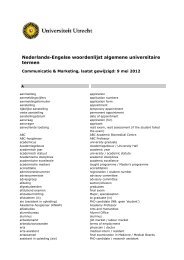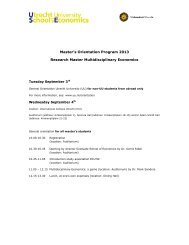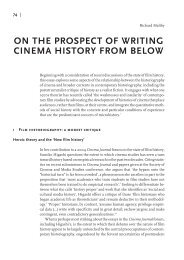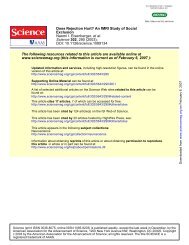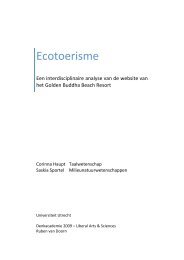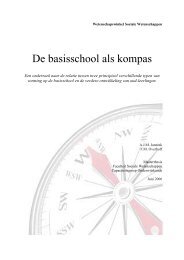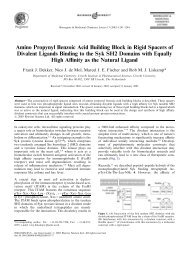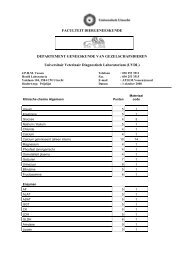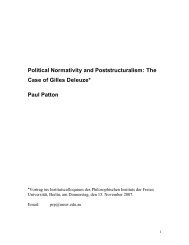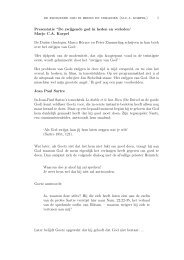Review of the Research Institute for History and - Universiteit Utrecht
Review of the Research Institute for History and - Universiteit Utrecht
Review of the Research Institute for History and - Universiteit Utrecht
You also want an ePaper? Increase the reach of your titles
YUMPU automatically turns print PDFs into web optimized ePapers that Google loves.
Threats<br />
R<strong>and</strong>om retirement <strong>and</strong> ditto budget cuts can potentially unhinge certain research areas. Due to <strong>the</strong> imbalanced<br />
age-structure <strong>of</strong> tenured faculty, where very few appointments are made, almost all programmes are<br />
threatened by aging. For <strong>the</strong> past years postdoctoral researchers have drawn attention to <strong>the</strong> fact that, due to<br />
budget cuts, <strong>the</strong>re are not enough opportunities <strong>for</strong> <strong>the</strong>m to acquire tenured faculty appointments.<br />
As long as PhD-students remain employees, <strong>and</strong> <strong>the</strong>ir salaries keep rising at <strong>the</strong> current rate, <strong>the</strong> number<br />
<strong>of</strong> PhD positions will continue to drop. The number <strong>of</strong> places has indeed already reached dramatically low<br />
levels. With <strong>the</strong> creation <strong>of</strong> a local Graduate School, <strong>the</strong> relationship between local training <strong>and</strong> courses provided<br />
by national research schools is in urgent need <strong>of</strong> revision.OGC favours a combination <strong>of</strong> local responsibilities<br />
with national programmes. Deans <strong>of</strong> <strong>the</strong> Dutch Faculties <strong>of</strong> Arts are also in favor <strong>of</strong> maintaining <strong>the</strong><br />
research networks created by <strong>the</strong> national research schools.<br />
OGC is increasingly successful in raising NWO funding, but this also has a serious drawback, as NWO<br />
requires ever-larger matching components from local institutions. The autonomous allocation <strong>of</strong> research<br />
funding is liable to suffer.<br />
Analysis<br />
OGC’s ten research programmes have developed different pr<strong>of</strong>i les, with respect to output, cooperation <strong>and</strong><br />
international networks. These variations are <strong>the</strong> result <strong>of</strong> varying combinations <strong>of</strong> personal <strong>and</strong> structural<br />
factors. The current evaluation none<strong>the</strong>less hints at a number <strong>of</strong> general conclusions. Proportionally, groups<br />
with a strong internal cohesion tend to be <strong>the</strong> most productive. Output <strong>of</strong> scholarly publications per fte<br />
research time is above average <strong>for</strong> <strong>the</strong> programmes Ancient <strong>and</strong> Medieval Culture; Cultural Construction<br />
<strong>of</strong> Media; Arts, Cultura <strong>and</strong> <strong>the</strong>ir Contexts; Social <strong>and</strong> Economic <strong>History</strong> <strong>and</strong> Gender Studies. These groups<br />
have also been most successful in obtaining external funding. The internal cohesion <strong>of</strong> <strong>the</strong>se groups pr<strong>of</strong>i ts<br />
from a combination <strong>of</strong> circumstances, but one seems to be <strong>of</strong> overriding importance: successful groups tend<br />
to collaborate more (internally as well as externally) than <strong>the</strong>ir less successful counterparts. Even if <strong>the</strong> original<br />
ideas <strong>and</strong> inspiration <strong>of</strong> individual researchers will remain an important, even decisive factor, especially<br />
in <strong>the</strong> humanities, scholarly success tends to grow where such individual ef<strong>for</strong>ts are combined. With this in<br />
mind, OGC management stimulates <strong>the</strong> organization <strong>of</strong> regular research seminars—not a regular feature <strong>of</strong><br />
OGC programmes so far—<strong>for</strong> all programmes, with local, national <strong>and</strong> international presentations <strong>of</strong> workin-progress.<br />
Adjusted strategy <strong>and</strong> goals<br />
OGC management is even more actively engaged than in <strong>the</strong> past in fund-raising ef<strong>for</strong>ts, so as to exp<strong>and</strong> <strong>the</strong><br />
institute’s research budget. At <strong>the</strong> same time it will help create a situation to protect tenured faculty’s research<br />
time; <strong>the</strong> research quarter that will be applied throughout <strong>the</strong> Faculty <strong>of</strong> Arts as <strong>of</strong> September 2005 is a major<br />
step in that direction.<br />
Within <strong>the</strong> context <strong>of</strong> <strong>the</strong> Graduate School Arts & Humanities, soon to be created, renewed ef<strong>for</strong>ts will<br />
be made to improve <strong>the</strong> numbers <strong>of</strong> PhD-students actually graduating within <strong>the</strong> time-limits set by <strong>the</strong> university.<br />
A clarifi cation <strong>of</strong> <strong>the</strong>ir status—students or employees—should also help clarify responsibilities <strong>for</strong> <strong>the</strong><br />
projects undertaken by PhD-students.<br />
Collective ef<strong>for</strong>ts, both in <strong>the</strong> development <strong>of</strong> research projects, as well as in regular research seminars,<br />
are promoted <strong>and</strong> fi nancially supported. We hope to help set up a European network <strong>of</strong> humanities institutes<br />
in <strong>the</strong> next couple <strong>of</strong> years. OGC management has also been a prominent participant in <strong>Utrecht</strong> University’s<br />
ef<strong>for</strong>ts to create a comprehensive exchange agreement with <strong>the</strong> University <strong>of</strong> Cali<strong>for</strong>nia system, which is set<br />
to be <strong>for</strong>mally concluded in <strong>the</strong> Summer <strong>of</strong> 2005.<br />
To improve international visibility, OGC management has ensured that all faculty now have a personal<br />
internet-page, that includes a list <strong>of</strong> individual publications since 1997. OGC is actively engaged in promoting<br />
international cooperation. Participation in CHCI enhances international visibility on an institutional level. 11<br />
379 <strong>Research</strong> <strong>Institute</strong> <strong>for</strong> <strong>History</strong> <strong>and</strong> Culture OGC





